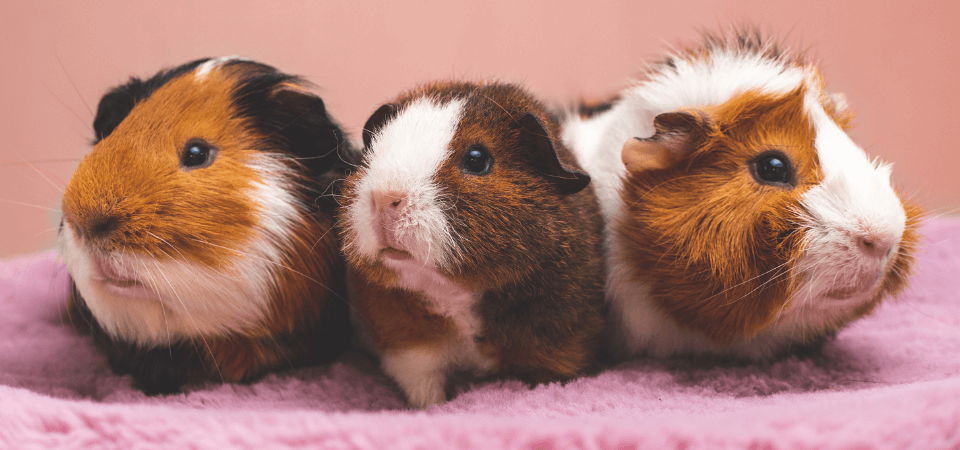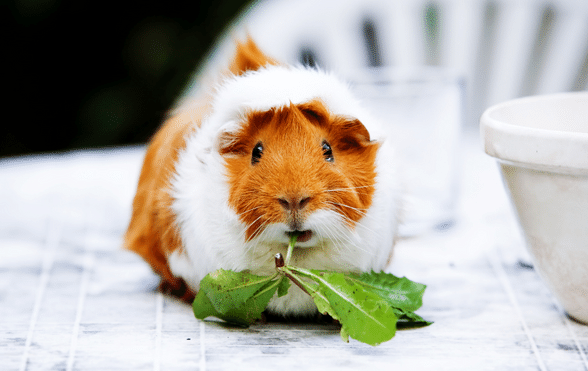Vet Expert Dr. Sophie Bell looks into the issue of Gut Stasis in Guinea Pigs, diagnosing, and giving advice on how you as an owner can prevent, and how it is treated.
Is your Guinea pig insured? Get a quote for £2,000 of vet fee cover | We’ve been insuring exotic pets since 1996 | Check out our customer reviews on Feefo.
Guinea pigs require regular monitoring when it comes to their food intake. Although stress and underlying medical disorders or problems with the teeth can play a role, a poor diet and inappropriate feeding regime is often the cause of gut stasis.
Gastrointestinal or gut stasis is a condition where the normal bacteria found in the digestive tract become out of balance and there is a reduction in contractions of the stomach and intestinal muscles.
It is a common condition seen in Guinea pigs and should always be suspected if your Guinea pig decreases its food intake or is anorexic. If left untreated this condition can cause a rapid decline in health leading to extreme lethargy, weakness, and death.

Gut stasis and Guinea pigs
Symptoms of Gut Stasis
- Teeth grinding – known as bruxism
- Diarrhoea and/or soft faeces
- Lack of faeces or abnormally small faeces
- Lethargy and depression
- Anorexia or decreased appetite
- Heavy and/or rapid breathing
- Bloated abdomen – bloat is life threatening
- Hunched position
- Hiding away
- Grunting
- Your vet will hear reduced gut sounds
Diagnosis of Gut Stasis in Guinea Pigs
Any Guinea pig with a decreased appetite should be examined by your vet. The main part of the examination will be palpation of the abdomen which can feel distended and firm, and likely to be uncomfortable. If very firm it could be bloat which is life threatening. Also, your vet may use a stethoscope on the abdomen to listen for gut sounds to determine if there is any movement.
Find a local vet here.
Abdominal palpation may also reveal a blockage, but an x-ray is usually performed to determine the cause and to ensure it is not life-threatening bloat.
A thorough examination of the teeth will be carried out. Overgrown teeth cause pain and can be the primary cause of the stasis due to the reluctance of the Guinea pig to eat.
The temperature, heart rate and respiration rate will be examined. Guinea pigs with gut stasis can have a lower body temperature, usually lower than 38˚C and breathing maybe rapid and/or laboured.
Additional tests may be carried out including abdominal x-rays and bloods to determine if there are any other underlying health problems leading to the gut stasis such as liver disease.
Treatment of Gut Stasis in Guinea Pigs
If there is a blockage, surgery is sometimes required. Most of the treatment administered is symptomatic and focuses on pain relief, hydration, diet correction and the administration of medications that stimulate the gut.
Pain relief can include meloxicam, something you may be required to give at home. In patients showing marked pain, opiates such as buprenorphine will be given. Pain relief is important as it can be a major reason as to why your Guinea pig is not eating.
Fluid therapy is key and depending on the severity will be administered subcutaneously or intravenously. Guinea pigs become dehydrated quickly with this condition, and fluids can dramatically improve the stasis and get those guts going.
Metoclopramide is a commonly administered drug used to stimulate gut motility. Again, you may have to administer this at home unless your Guinea pig is hospitalised.
Movement is important to get those guts moving. Hospitalised patients will be given regular exercise, and if managed at home, movement should be encouraged. Throughout recovery, your Guinea pig will also require rest, somewhere that is peaceful and away from anything they may find stressful.
Diet therapy is an important part of achieving a full recovery. Offering lots of fresh leafy greens such as kale and spinach, often fed wet to encourage water intake. Alongside greens Timothy hay should be offered, high in fibre and an important part of the diet to keep guts healthy.
Did you know? Guinea pigs are unable to vomit. This means everything that goes in, must come out via one direction, making it vitally important to keep those guts moving.
Diet in helping Gut Stasis
A poor diet is a major cause of gut stasis. Firstly, an excess of pellets, your Guinea pig only requires a very small amount daily. Muesli style mixes are best avoided as Guinea pigs tend to pick out the sugary bits and leave the rest, which can result in too much sugar in the diet.
Offering foods such as bread, and crackers can slow the gut down just like offering too many pellets.
Roughage should form a major part of your Guinea pig’s diet. Hay is vitally important and should be always available. Ensure you use a good quality hay such as Timothy hay and remove old hay regularly. Not only does hay help wear down rodents’ teeth, it also provides optimum conditions for bacteria in the gastrointestinal tract resulting in good digestive health and minimising the risk of gut stasis.
Offering green leafy veg will provide your Guinea pig with much needed vitamin C and help with hydration and gut health. Fresh vegetables can be offered daily alongside a few pellets and plenty of hay. Keep fruits to an occasional treat, they contain lots of natural sugars and can result in weight gain and impact gut health. Obese Guinea pigs are at a greater risk of developing Gut stasis.
Guinea pigs also love herbs! Parsley is full of vitamin C and can be safely offered. Chamomile is a fabulous herb to offer! It can play a huge role in our Guinea pigs digestive health and would be an ideal addition to their diet. Always check before giving herbs that they are safe. Tarragon, marjoram, chives, sage, onion and garlic are herbs to avoid, never feed them in any amount!
As diet plays an important role in preventing Gut Stasis, read our Guinea pig diet article here.
Benefit of Space and Exercise in Gut Stasis
Providing plenty of space for exercise and encouraging it is vital. Exercise will also keep them at an optimum weight, obese Guinea pigs will be at risk of a multitude of health problems.
Adding a daily probiotic to your Guinea pig’s diet can help with normal digestion enormously. Be sure to pick a species-specific product, do not use your dog’s probiotic for your guinea pig!
Stress leading to Gut Stasis
A cause of many health problems can be stress related. That can be due to boredom, loneliness (Guinea pigs should be kept in pairs or groups), lack of space and being unable to display normal behaviours, a poor diet, bullying from other Guinea pigs, extreme changes in weather, and a noisy environment.
Ensuring your Guinea pig’s environment is enriched and peaceful is extremely important.
Is your Guinea pig insured? Get a quote for £2,000 of vet fee cover | We’ve been insuring exotic pets since 1996 | Check out our customer reviews on Feefo.
Own a cat or dog? Get pet insurance that covers up to £12,000 for dogs and £9,000 for cats in vet fees every year, including dental for illness and accidents with British Pet Insurance.

